#Hankow Road
Photo

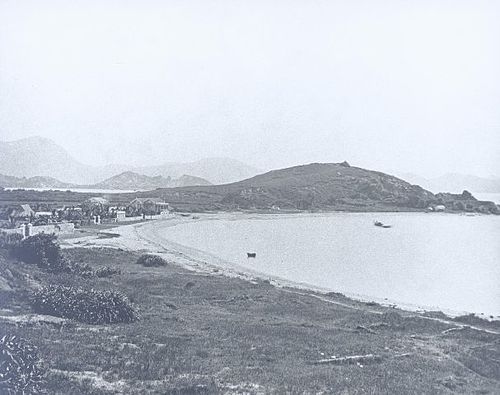


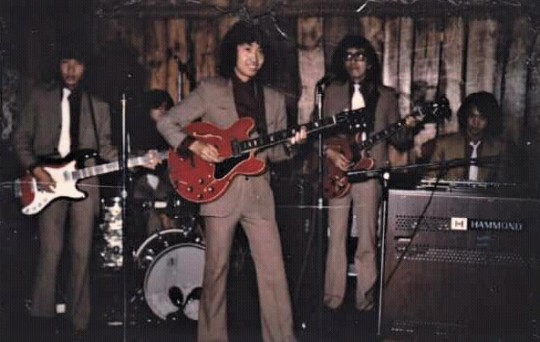

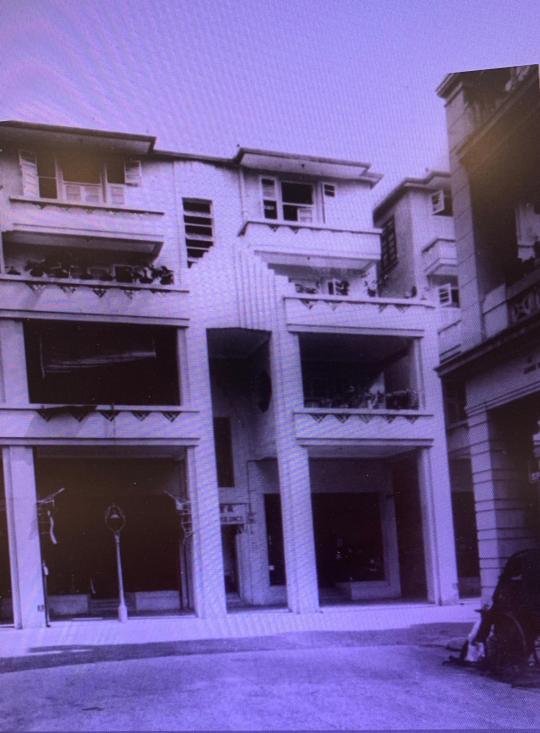
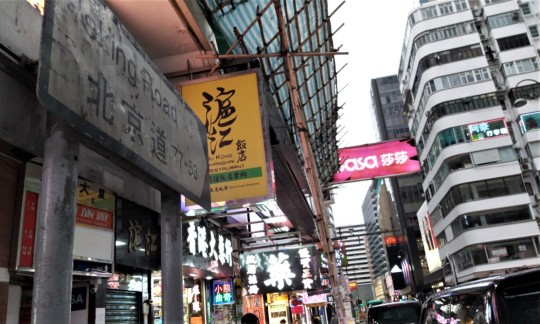


THE OLD OLD CHERRY OF HOME: ROMANTIC TSIM SHA TSUI OF HONG KONG IN THE 50S & 60S
Hong Kong is small. We do not have hometowns. We have ‘home districts’. We miss our home districts. Where we came from is now gone. But, your heart is obsessively held by the beautiful district that you cannot forget.
Let us examine the old old districts of Hong Kong, say around 100 years ago. Western District used to be a nightlife area and is now outdated. Sheung Wan was a Chinese business hot pot and is now in the embarrassing process of gentrification. Central, after years of ruthless demolitions of office buildings, got a Botox face which we could no longer recognise. Wan Chai was a gathering place of seamen and soldiers. It is now eclectic, devoid of any orderly style. Hong Kong’s crown jewel is the most famous tourist area Tsim Sha Tsui, possessing all the histories, diversities, humanities and charms of city, from colonial to modern days.
Tsim Sha Tsui was one of the immediate causes of the notorious Anglo-Chinese War in 1840. In 1839, a villager in Tsim Sha Tsui was beaten to death by a British soldier but the British government declined any responsibility. National hostility of 2 nations began.
The hillocks of Tsim Sha Tsui were inhabited before 1830s, and the place was shaped like a nose running down to the Victoria Harbour. The southwest of Tsim Sha Tsui was a pier with warehouses. There was railway with a clock tower in the opposite southeast. Due to the surrounding large blocks of rock now known as Kowloon Park and Observatory Hill, Tsim Sha Tsui was safely secluded from the ‘poor man’ areas of Jordan. The town centre was divided into 2 parts in the 1940s: south of the main street Nathan Road, where Her Majesty The Queen’s birthday parade later took place in the 1950s, was an area swamped by nice hotels which entertained flocks of English and American tourists. It used to be the shopping paradise full of shops selling jewels, antiques, paintings, embroideries and rattan furniture. Street names were very Chinese such as Canton Road, Peking Road and Hankow Road. There was even a street with a Vietnamese name i.e. Haiphong Road. The north of Nathan Road was a residential area crammed with houses and cream-coloured blocks. The exclusive and opulent hotels there such as Astor Hotel and Grand Hotel attracted tourists as well as bars along Humphreys Avenue and Carnarvon Road. It is sad that all the old hotels and bars now disappeared without leaving a trace. The street names there were nostalgically English such as Cameron Road, Granville Road, Kimberley Road and Austin Avenue.
Simon Wong, a band drummer and now retiree whose family has lived in Tsim Sha Tsui for generations remembered, “I love Tsim Sha Tsui and am proud of it. It was a truly international and outstanding district even during the years when Hong Kong was still backward in the 50s and 60s. Tsim Sha Tsui stood out elegantly. People escaped from Peking, Shanghai, Tianjin, Macau, India, Vietnam and Malaysia and even Russia to Tsim Sha Tsui where it was easier to find a job and there was no discrimination against individuals on the basis of their country, skin colour or ethnic origin. Apart from Chinese, English was the most common language spoken. Most Chinese immigrants did not speak Hong Kong local dialect. Food was fantastic. We had gourmets from every country. The Russians who were refugees in the 1950s got us the borscht, a popular soup from Eastern Europe. I enjoyed the English fish and chips sold in Cornwall Avenue. The top Indian restaurants were in Tsim Sha Tsui and they sold spicy but cheerful curries.”
Simon added, “Tsim Sha Tsui had a lot of tourists, expats and international population. From high class shopping to energetic nightlife, there were many reasons to love this unique and charming district. We also had a highly developed bar culture. Almost every hotel had a bar or lounge. Our band performed in several bars. I still kept the remembrance of the happy moments when we sang and talked in such places.”
Plastic surgery was given to Tsim Sha Tsui in the 80s in order to create a twin along the abandoned railway in the east. The new district was called Tsim Sha Tsui East, an un-inspiring and dull area with a geometrical pattern of office towers. Soon, this pseudo-Tsim Shan Tsui area was tarnished by the expensive, tacky and bad taste ‘Japanese nightclubs’. Then, gangsters invaded the tract. Tsim Sha Tsui lovers felt lost, hesitant and sad at this sad change.
The affliction of our city is not that romantic beautiful thing ended so soon, but that we are no longer able to create new things which are better enough to replace the old.
Acknowledgement: HKU Library
youtube
Russians in Hong Kong
#Anglo-Chinese War#Victoria Harbour#Tsim Sha Tsui#Kowloon Park#Observatory Hill#Astor Hotel#Grand Hotel#Canton Road#Peking Road#Hankow Road#Haiphong Road#Granville Road#Cornwall Avenue#Humphreys Avenue#Nathan Road#Carnarvon Road#Cameron Road#Kimberley Road#Austin Avenue#Hong Kong Borscht#Hong Kong Fish And Chips
0 notes
Photo

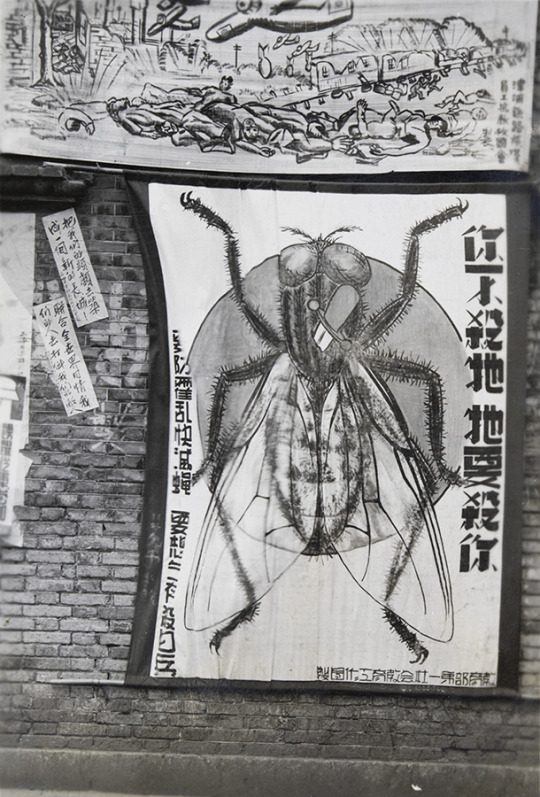


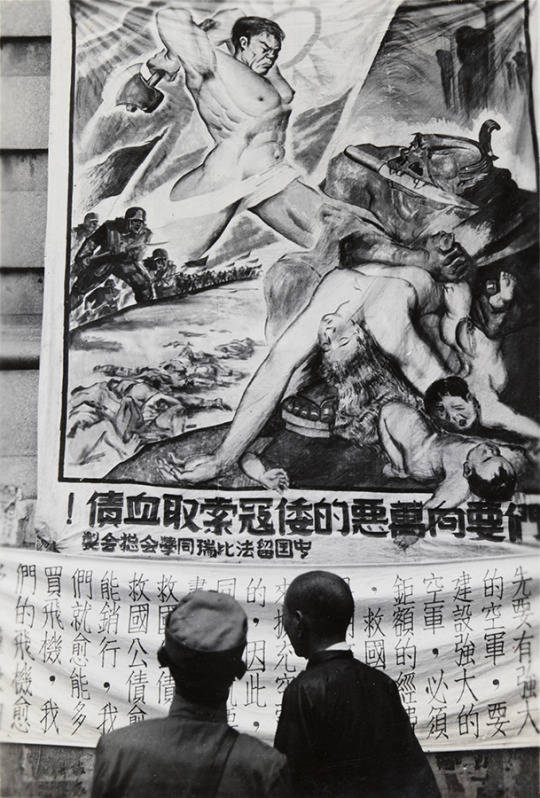
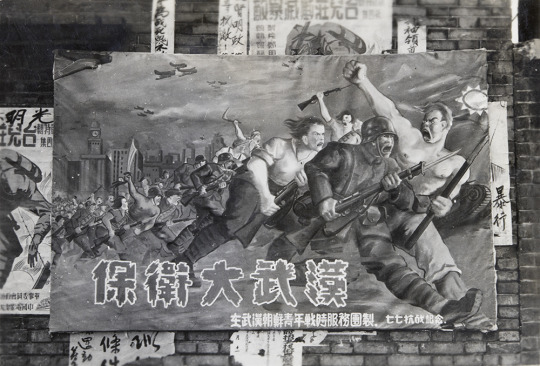


Propaganda posters in Wuhan, mid-1938. Found in an album that had belonged to Leslie Reginald Frederick Shrimpton RN (1910-1964), who served on the gunboat HMS Falcon in China waters from 1937 to 1939. All photographs and descriptions with translations from University of Bristol - Historical Photographs of China.
1) The banner depicts Nationalist forces attacking the Japanese. The Chinese text on the banner urges viewers to join the military, fight the Japanese, and thereby defend China. Bi-s168
2) Anti-Japanese public hygiene banner. The slogans on the lower banner (depicting a fly with a Japanese Rising Sun Nisshōki emblem) read: 'We need to knock down our enemies with the world's sympathy on us'. 'We need to prevent cholera and kill flies; and if you want to survive, kill the Japanese soldiers'. 'If you don't kill it, it's going to kill you'. The higher banner depicts Japanese bombers attacking a train. A wall poster on the left reads: 'Build a new Great Wall with our heads'.
3) Banner by L'Association des Etudiants Chinois de Retour de FBS (France, Belgium and Switzerland Returned Students Association), Hankow (Hankou). The banner text provides explicit details that accompany the image of 'cruel massacre and rape never before heard of'. Bi-s163.
4) Propaganda banner featuring Chiang Kai-shek. The slogans on the banner read: 'War of Resistance to the end!' and 'Support the leader'. Chiang Kai-shek is depicted beside Hankou (Wuhan) on the map of war-torn China. This photograph was taken in Wuhan.
5) The banner slogan reads: 'We demand that the Japanese repay their blood debt!' Photograph taken in Wuhan. Bi-s164. Photograph 3 shows the same building in a different location.. The actual term used here for 'Japanese' is 倭寇 'Dwarf pirates'. Bi-s167.
6) The main banner, showing charging soldiers and workers, bears the slogan: 'Defend Wuhan!' The Hankou (Hankow) bund is depicted in the banner - the clock tower is part of the Custom House. The banner was made by the 'Korean Youth Wartime Service Corps' (朝鲜青年战时服务团), founded in Wuhan in December 1937 by leftist Korean nationalists. Bi-s166.
7) Banner outside the headquarters of "L’Association des Etudiants Chinois de Retour de FBS", Wuhan. The banner was made by L'Association des Etudiants Chinois de Retour de FBS (France, Belgium and Switzerland Returned Students Association). The banner slogan reads 'Mobilize the power of the masses to defend Wuhan'. Sign on the window of the L'Association des Etudiants Chinois de Retour de FBS headquarters building at 69 Jianghan Road (江漢路六十九號) in Hankow (Hankou), in French: BUFFET & BILLIARD. Sign on the window in Chinese: Cold drinks / Coffee. Bi-s162
8) Remarkably, famed war photographer Robert Capa took this photograph of the street from inside of 69 Jianghan Road. This was identified by the excellent Visualizing China blog, and the image is marked from the International Center of Photography/Magnum Photos, who published it with other photos in 2018.
#wuhan#武汉市#hankou#war propaganda#propaganda#propaganda posters#black and white photography#sino-japanese war#sino japanese war#kuomintang#L'Association des Etudiants Chinois de Retour de FBS#朝鲜青年战时服务团#royal navy#republic of china#patriotic resistance#resistance to japan#japanese aggression in china#robert capa
33 notes
·
View notes
Text
Faye Wong's career: Hong Kong never changed her (2010)
by Wu Qi
The impact that Faye Wong left in Hong Kong can still be felt in this world today where trends are constantly changing. When the media mentions Faye Wong, they refer to her as "Heavenly Queen". Every time she returns to Hong Kong to go shopping, it still causes a frenzy for the paparazzi.
The streets of Hong Kong in August are busy. Our reporter wanted to see where Faye Wong first became popular. However, Alvin Leong, her music producer for many years, said that the recording studio on Kimberley Road where Faye Wong’s first audition was held in 1989 is now gone. And S&R studio on Hankow Road, where he produced her first few albums, was closed around 1997.
Instead, we met at AVON recording studio on Nanking Street in Kowloon where Faye Wong recorded the famous song FRAGILE WOMAN. This location is not very spacious, but it occupies two of only three of the remaining professional recording studios in Hong Kong today. Hong Kong's recording industry was once a big star-making factory. Now looking back at the golden age of the 1980s and 1990s makes people feel a bit emotional.
Intentionally or unintentionally, Faye Wong and the Hong Kong pop music she represented in the 1990s reached a legendary climax and ending.
She once led Hong Kong trends and left her mark as a maverick. But few people saw her innermost silent struggles. Chan Siu Bo, the owner of Cinepoly Records, regarded it as a conflict between a Beijing girl and Hong Kong culture. And in the end, her individuality was bigger than this city that could have drowned her. She could let go of her reputation and work, but she could never let go of her character. She was true and stubborn.
In the eyes of those who know her, there are only two kinds of people in Faye Wong's world: acquaintances and strangers. Among acquaintances, Faye Wong is compatible with those who are straightforward and natural and she regards them as friends. For people she doesn't know well, she never tries to figure them out and often ignores them.
Music critic Wong Chi-wah told our reporter that before Faye Wong, there were almost no female pop singers in Hong Kong who expressed themselves through their creative work. The producers were always in control of female singers. However, Faye Wong and her producers collaborated together. Hong Kong people could see a different culture through her eyes. As Faye Wong expressed in her song EXIT — "I have a lot of problems that can’t be solved; I lack patience and nothing can satisfy me; I often offend people, which seems to be a natural talent; I hate being famous, but also want attention." It was a combination of Western pop music, Hong Kong culture, as well as northern China’s culture that liked to explore the meaning of music. As she herself said, "If you don’t have feelings for it, how can you perform it? This [making music] is not as simple as making a shirt." Music critic Fung Lai Chi said that Faye Wong's songs never stopped expressing herself. From early Cantopop to AOR (Adult Oriented Rock), she bid farewell to R&B and then absorbed trip hop and psychedelic electronic music. In the world of music, she was looking for an exit.
"Mainland Girl" Wong Jing Man
"What songs have you listened to recently?"
"There’s a song called HOWEVER THAT DAY, it sounds very good!"
"Who sang it?"
"Wong Jing Man."
"Wong Jing Man?! No way, you are so corny! How can you like her?"
At Metro Radio Station in Whampoa Garden in Hong Kong, Lin Boxi described to our reporter the attitude of Hong Kong girls towards Faye Wong back then. Lin Boxi was born and raised in Hong Kong and is very local. He spoke Cantonese while vividly describing Wong Jing Man of those early years.
"Hong Kong fans were snobbish. At that time, I felt that everything in the Mainland was inferior. The singing from the north was very old-fashioned. Generally, girls liked Shirley Kwan, Vivian Chow, and Sandy Lam. Everyone knew that Wong Jing Man sang well, but she was not trendy so her songs were not popular!"
Lin Boxi said that he was in high school when Wong Jing Man made her debut in Hong Kong. Now as a well-known radio DJ in Hong Kong, in his analysis, her identity as a "Mainland Girl" was an obstacle for Hong Kong people to accept her as a singer.
Today, the streets of Hong Kong in August are hot. But there are no big stars in the colorful magazines that can touch the nerves of all the Hong Kong people. The birth of Gigi Lai's daughters and Dai Si Chung's death occupy the most pages. However, in the past two days, the media found old photos of Dai Si Chung and his student Faye Wong. In the photo, Faye Wong had a mushroom hairstyle, thick eyebrows and red lips. She wore a red-gray crop top showing her waist. Her expression was flat. The caption next to the photo said: "Faye Wong in the old days. Although she could sing, no record company was willing to sign her."
Most people don't know that Faye Wong's mainland identity was actually not a bad thing for the record company that signed her.
Chan Siu Bo, the owner of Cinepoly Records, liked her "Mainland Girl" background - it represented a market that could be developed. Hong Kong people used to call Chan Siu Bo the "Little Treasure". He was a famous DJ in the 1980s and then became owner of Cinepoly Records under the subsidiary of Polygram. His company became popular because of Faye Wong, Beyond, Leslie Cheung, etc. Chan Siu Bo now in his early 50s, has returned to Metro Radio to be a DJ. He can speak relatively fluent Mandarin, which is not so Hong Kong-like. Both of our chats were conducted at Metro Radio in Kowloon.
Chan Siu Bo told our reporter that when Faye Wong appeared in front of him in 1988, it was a period of time when he was busy drinking with his friends and bidding them farewell. "Hong Kong’s return to China in 1997 was getting closer. Hong Kong’s emigration wave began in 1980. It was almost 1990. It seemed that every day there were friends who wanted to emigrate and bid farewell. In the end, I decided not to leave. I was thinking that if I had the opportunity to sign a mainland singer, it would be great."
Chan Siu Bo said that at that time, Dai Si Chung called him and introduced a student from Beijing named Faye Wong and wanted him to listen to her tape. "The students introduced by Mr. Dai were usually pretty good." Faye Wong's tape was in the hands of Alvin Leong, a producer at Cinepoly. Alvin Leong was born and raised in the United States. After finishing high school, he studied for another year in college and then went to Hong Kong for summer vacation when he was recruited by Universal Music. He maintains a beautiful mustache and speaks very gently and humble. Thinking back more than 20 years ago, he spoke about the success of his and Faye’s collaboration: "It just so happened that the music we enjoyed was very similar. Ah Fei and I were both outsiders with nothing to bond us except for the music that we enjoyed.”
In the 1980s, Alvin Leong said that he was very busy every day. "At first, I didn't care about Faye Wong's tapes at all. Every day someone brought tapes over and wanted to listen to them." A few months later, he accidentally picked it up and listened. Faye Wong sang a song by Teresa Teng, "The hairs on my arms stood up when I heard it. It sounded so impressive!"
Then, Chan Siu Bo also heard Faye Wong’s audition of Teresa Teng’s song SMALL TOWN STORY: "Compared with the average Hong Kong person, I have a sense for Mandarin songs. I was very excited. When I took the taxi, the driver was listening to Teresa Teng’s song. I took out Ah Fei’s tape and said: Change it to this and listen, it sounds like Teresa Teng.” Today, more than 20 years later, Chan Siu Bo no longer remembers the driver’s reaction. He only remembers his excitement. The music man had found someone who could sing.
Chan Siu Bo said that although he was born in Hong Kong, the influence of his parents in Shanghai far exceeded the narrow boundaries of Hong Kong. "Although I hadn’t been outside of Hong Kong much, in terms of music, I felt like I had gone to university abroad."
The first boss and first music producer Faye Wong met in Hong Kong happened to be not very "Hong Kong-ized." When Chan Siu Bo told Alvin Leong that this mainland girl couldn't speak Cantonese, Alvin thought: “When I returned from the United States, I couldn't speak Cantonese either!"
Very simply, after listening to the two songs recorded by Faye Wong, Chan Siu Bo decided to sign her. "When I think about it now, I was too daring." Chan Siu Bo said that he had never even seen Faye Wong's face at the time and there were clearly inaccurate pronunciations in the Cantonese song that she auditioned. "She was a little girl of 18 or 19 years old. If you can’t learn Cantonese well in your 20s, then the music business will be difficult to handle.” At that time, Hong Kong had no market for Mandarin songs. Chan Siu Bo recalled that the publicity department manager, nicknamed "Red Bull", rushed into the room and said, "Did you sign a "Mainland Girl"? I won't send her songs to the radio stations! Do it yourself!”
But Chan Siu Bo's risk to sign Faye Wong was not completely impulsive. Cinepoly Records was a subsidiary of Polygram and Polygram had popular artists such as The Wynners Band, Alan Tam, and Teresa Teng. "So I told the boss of Polygram that the person I signed corresponded to him. You have The Wynners and I have Beyond; you have Alan Tam and I have Leslie Cheung; you have Teresa Teng and I just signed Faye Wong.”
"Her potential is greater."
In fact, Cinepoly originally planned to develop Faye Wong as the next generation Teresa Teng. Alvin Leong disagreed with this idea. He liked European and American pop music and was unwilling to produce a style that he was not interested in. Chan Siu Bo saw that Sandy Lam was very popular at the time. Her Cantonese songs had a taste of R&B which was quite unique. Therefore, Chan Siu Bo said that he and Alvin Leong decided: "We can add R&B style to Ah Fei, but not too much. She can't be another Sandy Lam, nor can she be another Teresa Teng." Chan Siu Bo understood that the singers of Hong Kong did not have a voice like this Beijinger, Faye Wong, "Don't waste her talent, her potential is greater."
Alvin Leong recalled that Faye Wong first came to him in the summer. She wore a short-sleeved T-shirt, simple curls in her hair, and no makeup. "I saw this girl that was very fresh. Hong Kong girls do not seem to have such a temperament. She was tall, very simple and clean." Alvin Leong said that he has met many beautiful girls who like to sing. But basically, the first time they audition and the sound comes out, the girls would say: “I have a bad voice today.” He understood that this was due to their nervousness. Faye Wong did not have this. "I asked her if it was OK to record, she said yes and started singing without any further questions. She has always been confident in singing."
Alvin Leong said that Faye Wong was the most comfortable and happy when she was with him. Faye Wong who grew up in Beijing had only Teresa Teng’s songs as her musical enlightenment. Alvin Leong, who had returned from the United States, knew European and American pop music and had a wide-open vision. Alvin Leong told our reporter about those days: "We were like friends. I brought discs for her to listen to. She liked it very much and wanted to try those styles.” At that time, Alvin Leong liked R&B in the 1980s. “It was a more soothing sound which is different from the current hip-hop feeling. I liked that rhythm. I thought Ah Fei could try this style.” Chan Siu Bo said that new singers were like children and producers generally played the role of brother or father. Alvin Leong, who is 7 years older than Faye Wong, never deliberately taught her any rules. He said, "There cannot be two artists in a recording studio."
The Hong Kong pop music industry in the 1980s and 1990s was famous for its "quick hand" which adapted popular songs from Europe, America and Japan. Most songs on a record were adaptations. There were few music creators in Hong Kong, but the frequency of recording was very high. Many singers released a new record every 6 months. Alvin Leong doesn't think there is anything wrong with cover songs. He said that the song must conform to the attributes of Cantonese songs. It is actually not easy and it is a very professional creation process. R&B is the most difficult genre to match with Cantonese lyrics. If the sound of the word is accommodated, the rhythm is lost. "We simply ignored whether the sound of the word was correct or not. We adapted to the rhythm of R&B and twisted the sound a little. When older generations and musicians were present, we were not be allowed to sing like this."
The creative atmosphere was casual and comfortable, "We didn't have meetings and we didn’t have a to-do-list of one, two and three. Ah Fei came to the office one day and I was playing a Japanese song. She said the song was good, so I gave it to her. The tune was adapted and we found someone to fill in lyrics and it became HOWEVER THAT DAY. Alvin Leong said that when they recorded the first album, they tried to find a local person to correct Faye Wong's Cantonese pronunciation. But they did not like spending time on things other than music. "Later on, we didn't care about the pronunciation. Anyway, if you don't understand it, you can read the lyrics!" Alvin Leong couldn't help but laugh when he said that.
He admired Japanese female singers EPO and Miyuki Nakajima, and R&B artists in the West. These artists formed the style of Faye Wong's first few records. "Gor Gor (Leslie Cheung) and Ah Fei were the two singers that I personally supervised. If Ah Fei did not show up, then I would apply these inspirations to Gor Gor." So to some extent in Faye Wong’s early songs, "She was like the female version of Leslie Cheung." Alvin Leong said that he could feel that the two singers were very talented, "If a section of the song was not recorded properly, Gor Gor would know to sing it again. Same with Ah Fei. I didn’t need to say anything. She knew which line to sing again. She is very talented in languages and later spoke Cantonese very well."
"For a long time, Ah Fei's records did not have a planned route. I would constantly listen to songs and then select them. And when producing, I made them according to the mood, environment and climate at the time. I didn't plan to use any style, just as long as it was comfortable." Alvin Leong said, “Faye Wong liked to stay in the studio while wearing casual clothes and slippers. She liked to say: This is my second home." Alvin Leong said they are both people who don't like talking and the world of music makes them feel at ease. After Ah Fei released a few records, they gained a little popularity. But when they needed to record songs, the two recording studios were not close and they didn't want to take a taxi. “She and I were still carrying the tapes and squeezing on to the subway like very ordinary people."
"Lau Fei Fei"
The world outside of music confused the Beijing girl Faye Wong. The Mainland China entertainment industry had just opened up and most people were puzzled by the very "nonsensical" entertainment methods in Hong Kong. Faye Wong, in Hong Kong people's eyes, didn't like to smile. In addition to her personality, her cultural background was also a factor. Before the recording of a TV show, she was told to smile more. She was stunned: "Why should I smile when I have no reason to?”
The impression that Faye Wong gave her Hong Kong colleagues in the early years was that she liked to ask ‘why’ for everything. "Why do I need to go out to promote?" "Why does the media ask me if I have a boyfriend? What does it matter to them?" At face value, these questions seem aggressive, but Faye Wong actually asked them sincerely. Chan Siu Bo’s understanding was: "Her method of expression was problematic and Hong Kong people didn't understand how Beijingers express themselves."
Hong Kong people take everything for granted in the star industry that they created. Chan Siu Bo recalled, "Colleagues told Ah Fei: Our crazy boss signed you and we have to promote you. There is no other reason! If you want to ask ‘why’, then go ask the boss." So Faye Wong was given a stage name Wong Jing Man and an English name Shirley. And she tried to embody a Hong Kong image in her early years.
Chan Siu Bo told our reporter that when there was a meeting, he or his assistant would always take a moment to answer Faye Wong’s ‘why's'. Chan Siu Bo said that Faye Wong was actually an obedient girl who did the publicity work, sang earnestly, spoke very mildly, and was never fierce. It's just that she didn't like some promotion [methods] and she would air her grievances: "I am not happy today." or "I did all the work, now can I take my vacation?"
Chan Siu Bo said that Faye Wong liked to return to Beijing, even if the Hong Kong media discriminated against mainlanders, Faye Wong ignored it. From 1989 to 1991, Faye Wong released 3 albums. The first album WONG JING MAN sold 25,000 copies and reached gold record sales in Hong Kong. She received good grades among the newcomers. But as Lin Boxi said, "The songs were not popular," to the average Hong Kong person. "The media didn't care about her, she was not beautiful, her figure was not hot, and there was no news."
After three albums, in 1992 Faye Wong suddenly decided to stop everything and go to the United States to study. Chan Siu Bo said that he had been transferred to the parent company PolyGram. The owner of Cinepoly was replaced. Faye Wong was not optimistic and she was totally incompatible with the new owner. Faye Wong asked Chan Siu Bo to go for tea before he left. He said, "I was in a bad mood after listening to her. I signed her and Beyond, but left midway. She said that she didn’t care and she wouldn’t sing anymore if she's not happy. She lost interest." At this point, Chan Siu Bo sighed, "This kind of mentality became acceptable later on, but most Hong Kong singers back then never dared to think like this."
Chan Siu Bo looked at Faye Wong’s plight at the time: "The public said that this artist was 'difficult.' Ah Fei is a typical Beijinger who likes deep music and has a more serious outlook on life. She feels that music is not a game, but Hong Kong entertainment is relatively relaxed, so Ah Fei always seemed out of place which formed her cold and arrogant image. This is a cultural conflict between Beijing and Hong Kong."
After arriving in the United States, Faye Wong once recalled: “There were so many strange, confident-looking people. They didn’t care what other people thought of them. I felt I was originally like that too, independent and a little rebellious. But in Hong Kong I lost myself. I was shaped by others and became like a machine, a dress hanger. I had no personality and no sense of direction."
She eventually came back to release COMING HOME, and she took the initiative to highlight her Beijing identity. The song FRAGILE WOMAN became popular on every street and avenue. Alvin Leong was worried that this song had a different style from the other songs on the album. But Faye Wong thought it was pretty good and unexpectedly this song was the beginning of her popularity in the Chinese-speaking world.
Hong Kong society is one where popular people are worshipped and Faye Wong, who changed back to her real name, immediately became a trendy idol. Lin Boxi told our reporter: "Before, everyone said she came from the mainland. But now she was back from the United States and suddenly she was very fashionable."
"One Hundred Thousand Whys"
In 1993, Faye Wong's album ONE HUNDRED THOUSAND WHYS caught the attention of music critics. She was always asking ‘why’ and referenced the popular book series "One Hundred Thousand Whys" from the Mainland. All her confusion about life was expressed by this album title. Generally, Hong Kong people were unfamiliar with this reference. Alvin Leong didn't understand the name of this album. "She explained it to me once and I forgot immediately. It didn't matter, just make the music you like." Alvin Leong said that he could feel that after coming back from the United States, Faye Wong had more musical ideas. In this album, from song selection to image design, Faye Wong's own style became more prominent.
Looking back, Alvin Leong regarded Faye Wong's first few albums as a learning stage. When they arrived at ONE HUNDRED THOUSAND WHYS, he officially discovered his own voice in music. The music critic Wong Chi-wah found a newspaper article from that year for our reporter. In September 1993, his harsher music critic colleague wrote an article called "This Faye Wong Has Courage" which said: "Who gave Faye Wong such courage? She does things her own way and her personality does not compromise with the persistent media. She has suffered somewhat. However, this stubborn girl did not yield obediently, but instead insists on her own choices more and more."
The next album RANDOM THOUGHTS was obviously influenced by British music and began Faye Wong's "The Cranberries" phase with the alternative style of the song DREAM PERSON. "Technically speaking, the music was very different from other Chinese songs. The effect of the electric guitar was very unique. Chinese fans didn't know what a ‘wah wah effect' was back then. The music of RANDOM THOUGHTS was alternative but compared with Faye Wong's more psychedelic songs later in her career, it was more comprehensible.”
Alvin Leong said that he fell in love with British music during that time and Faye Wong also admired this style very much. Music critic Fung Lai Chi believes that this was also a part of the shrewdness of Cinepoly Records. In his opinion, Faye Wong's popularity back then is like Jay Chou's influence in Chinese music now. "They are ahead of trends, not ten steps ahead, but one or two steps ahead. They very cleverly use foreign music elements, but they do not completely copy. After every two or three albums, the style will change and continue to break through. But not every album changes, because if the change is too fast, the average fan can't keep up."
Fung Lai Chi is the former editor-in-chief of City Magazine and now he is the content director of a music company and teaches popular music part-time at the Chinese University of Hong Kong. We met him in the dining room of the university. With him were young students who loved Jay Chou and an old man listening to Cantonese opera on the radio. Our reporter said: "This is Hong Kong, a peculiar place where music is integrated."
When comparing female singers who could come close to Faye Wong’s era, Fung Lai Chi believes that Anita Mui’s era was not as strong. “She was a singer and stage performer with many images. But her music was more dependent on the direction of the producer. For example, Xiao Chong once helped Anita Mui make Taiwan records. During that period, Xiao Chong liked hip hop and Anita Mui's songs reflected the style of Xiao Chong.”
Sandy Lam followed the Japanese idol route with fashion and song characteristics that were simple and youthful. Her song GRAY attracted young girls who were chasing that kind of style. Next, Sandy Lam's producer wanted to repackage her into a yuppie-style urban woman and she became a representative of women in Hong Kong of that era. Associating pop music with the feelings of urban women in Hong Kong, Sandy Lam in Jonathan Lee's period became a representative of yuppie middle-class Chinese women. Sandy Lam has her own ideas in music and her style is always looking for breakthroughs. In the middle and later stages of her career, she also participated in production and decided on her own path in music. However, when she teamed up with famous musician Jonathan Lee, “The personality and style of the producer was stronger than the singer."
Fung Lai Chi said that Faye Wong and Alvin Leong were more of a collaborative relationship. They incorporated the latest foreign trends but they did not deviate too far from mainstream Chinese.
"Fortunately, there was Faye Wong"
"It's good to talk to Ah Fei about music. She doesn't talk much, but she likes to talk about music." Alvin Leong has always regarded her as a musician. If you look back at the changes in the Hong Kong pop music industry, Faye Wong and Alvin Leong themselves did not expect that their musical experimentation as two young "foreign" people would push the Hong Kong music industry in an unprecedented direction.
Faye Wong’s first three albums were her "Wong Jing Man Period." Fung Lai Chi believes that these were basically Hong Kong-style pop songs, but with the addition of an AOR (Adult Oriented Rock) style. Although AOR is called rock, the rhythm is not intense. It is more elegant and mature, and the music is rich in form. It is more suitable for people around the age of 30. "Some of the songs come from the Japanese, typical AOR style. It’s a little fresh, but not a brand new feeling." Ballads dominated the entire Hong Kong market. Hong Kong people do not like entertainment that reflects social issues. "Usually I am very busy and tired. I want to have fun, not headaches when listening to music.” Therefore, love songs and some philosophical inspirational songs were the mainstays of the Hong Kong music industry.
Looking back, 1974 was considered the year of the first appearance of modern Cantopop music. Sam Hui incorporated Western-style pop songs with Cantonese lyrics. In addition, a series of martial arts theme songs such as "The Romantic Swordsman", "Heaven Sword and Dragon Sabre", "Duke of Mt Deer", etc. composed by James Wong and Joseph Koo became popular. Hong Kong finally had their own pop music. "Cantonese opera is a three-hour drama. Cantopop retains these elements and is written as a 3-minute pop song. This is the characteristic of typical Cantonese pop music." So "Cantopop" was born and became an official music genre.
Songs such as THOUSANDS OF SONGS by Priscilla Chan and Vivian Lai's EVERYONE HAS A DREAM are typical examples of very popular Cantopop.
After Faye Wong tried AOR and R&B in her first few albums, she entered the Bjork trip hop phase with FUZAO and DI-DAR. Trip-Hop is European electronic music that is more psychedelic. The lyrics are not quite understandable but they are not completely unintelligible either. Fung Lai Chi said that Lin Xi once talked about his perception of Faye Wong's style at the time: “She didn't know herself well and wanted to understand herself more.”
The album FUZAO is a favorite of music critic Wong Chi-wah. In 1996, he wrote a review in Hong Kong's Sing Pao Daily News: "Faye Wong's FUZAO album has three songs with strong "Chinese" elements: SPORADIC, RESTLESS, and DOOMSDAY. But there is no such feeling of being "done in a hurry" at all. It’s not clear whether it is because Faye Wong has gotten closer to Dou Wei that has caused her to gain a stronger literacy of Chinese music, or whether she had such self-development when she was growing up in Beijing, but it has enabled her to successfully overcome the difficulty of injecting "Chinese" elements into a small space! It is worth noting that Faye Wong's songs are mostly short in duration, but they give people an endless after-effect that is very wonderful." "If a song is good and does not exceed more than an octave, it must be a rare masterpiece. Because a song with a range too narrow will have great constraints on the creation of its melody. I personally like to collect good songs with a range of no more than an octave, but they usually cannot meet this criteria." But Faye Wong's FUZAO did which surprised Wong Chi-wah.
Wong Chi-wah told our reporter that around 1992, the music industry in Hong Kong was dying. Sam Hui retired, Alan Tam announced that he would no longer accept awards, and Leslie Cheung withdrew from the music scene. Without much news, the media created the "Four Heavenly Kings", and Faye Wong was the only other artist that could compete with them: "Fortunately, there was Faye Wong."
The Hong Kong pop music industry had never seen a female singer-songwriter before. "There are very few female singers who write songs to express themselves." Wong Chi-wah attributed it to the reality of Hong Kong society, "Everyone has to earn a living, and music and literature are not the way to earn a living." Among the rare singer-songwriters, Sam Hui is a representative. However, Hong Kong people used to have a relatively weak national complex. English was seen as advanced and Chinese was inferior. Rarely were there singers like Taiwan's Hou Dejian or Lo Ta-yu who showed remarkable creativity.
Beyond was also a creative band. Wong Ka Kui himself composed a lot of music but not many lyrics. Wong Chi-wah believes that Wong Ka Kui‘s lyrics were "characteristically sincere but not literary enough."
In Fung Lai Chi's view, Faye Wong had been searching for a path not only to improve music, but also make the commercial market greater. Fung Lai Chi said that in her songs CHANEL and ONLY LOVE STRANGERS, she returned to the mainstream a little bit and was not so alternative. There was a taste of European electronic pop and it was still very advanced for the Chinese music industry. Lin Xi once called Faye Wong and Alvin Leong the musicians who gave him the most creative space. When he wrote for Faye Wong, the lyrics were more abstract and more Buddhism-inspired. Fung Lai Chi said: "Listening to Faye Wong's songs, you can clearly feel her dynamic. She is a singer whose songs clearly reflect her."
In Chan Siu Bo's view, Faye Wong became more mature in dealing with people after returning from the United States. "She must have thought about a lot of things in those six months. Although she always said that she didn't like Hong Kong, she also learned to cherish her career in Hong Kong during that period."
It was Faye Wong's wish to expand abroad when she started singing. Chan Siu Bo said: "The Faye Wong I know wanted to sing Mandarin since the beginning. The development in Hong Kong was just a springboard for her. She clearly wanted to return to Mandarin." But from the record company’s point of view, Chan Siu Bo said that he saw more practical problems. "Faye Wong needed to stay in Hong Kong for 7 years to build her status before she could go to Taiwan to promote. She was going to sing Mandarin and we didn't know if there was a market.”
However, it turned out that her Mandarin song NO REGRETS with lyrics written by Faye Wong herself sold even better than the Cantonese version in Hong Kong. Therefore, "Hong Kong fans were blinded. She could do anything and it would be hot. For the record company, restraining a person on the rise would be stupid. She could do whatever she wanted."
Before becoming a producer for Faye Wong, Alvin Leong was responsible for arranging foreign singers to perform in Hong Kong at Warner Records. Perhaps it was because he was born and raised in the United States, in his eyes, stars behaving like themselves was natural. Therefore, Faye Wong’s behavior was natural to him: "Hong Kong idols all learned from Japan. The celebrities had to maintain a sense of mystery. You couldn't even talk about marriage and children. What is special about Faye Wong is that she is loyal to herself. Her self-contained style of performance wasn’t accepted by the media here. They thought that she was too cold and self-centered and that her speech was too blunt. But it’s not like she left in the middle of a song or anything. She still put her all into her performances. But the local media was not used to that."
Hong Kong people also did not understand Faye Wong's affection for Dou Wei. Chan Siu Bo remembered that at the time, Faye Wong asked Dou Wei to play the drums for a 10 minute interlude in her concert, "Hong Kong people didn’t understand what was so good about it, so they all went to the bathroom." The picture of Faye Wong at a Beijing hutong toilet was splashed all over Hong Kong tabloids after paparazzi secretly photographed her. As soon as the magazine came out, "Someone called me and said ‘the queen is ruined’. But I knew Faye Wong would be even more likeable after this. There are so many girls who fall madly in love. Why can't Faye Wong? She is this kind of person."
Having been with Faye Wong for many years, Chan Siu Bo and Alvin Leong watched her go from a girl less than 20 years old to getting married and having children and growing up step by step. They both said that they never heard her complain and they never heard her speak about regret. Regarding music matters, she takes it seriously and is fun to work with. Perhaps the current Faye Wong may be found in the lyrics to her song RED BEAN: "There are times, when I'd rather choose to keep this love alive and not let go / And wait until we have finished admiring this view / Perhaps you will keep me company / And watch the trickle of water flow forever."
------------------------------------------------------------------
SOURCE: SANLIAN LIFEWEEK // TRANSLATED BY: FAYE WONG FUZAO
4 notes
·
View notes
Photo

CODE:SEED 星火之歌
CODE:SEED 星火之歌
Game CODE:SEED 星火之歌 là dòng game Card
Giới thiệu CODE:SEED 星火之歌
A.D.2080年人類發現了發射著詭異輻射的月源石……之後數年間,大量的月源石被秘密投放到世界各地,無數人類被其輻射變異成為喪屍,而喪屍體內因輻射���產生的病毒使更多的人類感染,危機迅速擴散……危機之下,人類社會崩壞,全世界陷入一片混亂。
為了對抗喪屍,神啟集團的研究人員嘗試研究喪屍的變異細胞,並生產了特殊的基因改造藥劑來改造人體。被改造者獲得超常的戰鬥力和對喪屍感染的免疫力,而這些被改造者便被稱為 ———— 『種 火』種火戰士們被派往各地,成功幫助人們建立了數個安全區,但為了爭奪有限的資源,各個安全區之間鉤心鬥角……
而危機爆發的起因,仍隱藏在重重黑幕之後……
【遊戲介紹】
“來瞭解你的夥伴們吧,指揮官”
“種火戰士”們都是經過神啟公司基因改造的少女,她們各自擁有著獨特的超能力,是你在末世生存的依仗,對抗喪屍的夥伴,除了日常的戰鬥、訓練也不要忘記和這些少女們增進感情哦,也許你可以瞭解到她們不為人知的故事。
“辛苦了,指揮官,歡迎回來”
想要應對末日下複雜的局面,指揮官需要提升營地的綜合實力,清理周邊區域,建立防護系統、資源收集系統,以及各類幫助種火戰士們提升實力的尖端設備,在這些設備的幫助下培養她們,提升各方面能力,增強她們的戰鬥力,抵禦喪屍潮的入侵。
“指揮官,我們準備好了出發吧”
在對外探險的過成中嘗嘗會遇到分叉路段,每一條道路都會遭遇不同的事件,每次對外探險都需要終結地區的首領,才可以安全回家。是不懼屍群武力突破,還是躲避大部分喪屍群直取首領,就看你的選擇。
“戰鬥開始了,指揮官我們上吧!消滅他們!”
作為指揮官你必須熟悉每一位種火戰士的特點,每一位種火戰士都擁有三種不同形態效果的技能。滑動連接技能圖標便可以進行戰鬥,根據戰場情況以及技能效果選擇釋放的技能,是戰鬥勝利的關鍵。同時連接的技能圖標越多技能的威力和效果就越大。指揮官你有信心帶領我們贏得勝利麼?
【知名CV配音】
凱撒 CV斎藤千和
愛迪生 CV上阪すみれ
諾貝爾 CV水桐けいと
貝奧武夫 CV悠木碧
齊格弗裡德 CV白椛ひとみ
蘭斯洛特 CV小清水亜美
德川家康 CV井上麻裡奈
姜尚 CV藤沢れいか
拿破崙 CV日高裡菜
薛定諤 CV平出まどか
奧德修斯 CV植田佳奈
伽利略 CV金元壽子
赫拉克勒斯 CV石川由依
牛頓 CV日高裡菜
特斯拉 CV安野希世乃
【官方資訊】
《CODE:SEED星火之歌》官網預約頁:https://cs.gamemorefun.net
《CODE:SEED星火之歌》Facebook官方粉絲專頁:fb.com/codeseedtw
——請注意——
本遊戲需要網路連線
本遊戲為免費使用,遊戲內另提供購買虛擬遊戲幣、物品等付費服務。
請注意遊戲時間,不可沉迷遊戲唷 In AD2080, humans discovered a moonstone that emits sporadic radiation. In the following years, a large number of moonstones were secretly placed around the world, and countless human beings were mutated into zombies, and the virus produced by radiation in zombies. Infecting more humans, the crisis spreads rapidly... Under the crisis, human society has collapsed and the world has fallen into chaos.
In order to fight the zombies, the researchers of the Shenqi Group tried to study the mutant cells of the zombies and produced special genetic modification agents to transform the human body. The revamped people gained extraordinary combat power and immunity to zombie infections, and these revamped people were called ———— “Caohuo” fire fighters were dispatched to various places, successfully helping people to establish several safe areas. But in order to compete for limited resources, the corners between the various safe areas...
The cause of the crisis is still hidden behind the dark curtain...
【game introduction】
"To understand your partners, commander"
"Fish Warriors" are all girls who have undergone genetic modification by Shenqi Company. They each have unique super powers. They are the reliance of your survival in the last days. They are partners against zombies. Don’t forget these and other daily battles and training. The girls are raising their feelings. Maybe you can understand the stories they don’t know.
"Working hard, commander, welcome back"
In order to cope with the complicated situation at the end of the day, the commander needs to improve the comprehensive strength of the camp, clean up the surrounding areas, establish a protection system, a resource collection system, and various cutting-edge equipment to help the fire fighters improve their strength. With the help of these equipments. Train them, improve their abilities, enhance their combat effectiveness, and resist the invasion of zombies.
"Commander, we are ready to go."
In the process of foreign expedition, you will encounter a forked road. Each road will encounter different events. Every time you explore the outer region, you need to end the leader of the area before you can go home safely. It is not afraid of the corpse force to break through, or to avoid most of the zombies to take the leader, it depends on your choice.
"The battle is over, let's go to the commander! Destroy them!"
As a commander, you must be familiar with the characteristics of each kind of fire fighter. Each fire fighter has three different morphological skills. Sliding connection skill icons can be used to fight, and the skills that are released according to the battlefield situation and skill effects are the key to the battle victory. The more skill icons that are connected at the same time, the greater the power and effect of the skills. Commander, are you confident to lead us to victory?
[well-known CV dubbing]
Caesar CV 斎藤千和
Edison CV on Hankow
Nobel CV Shui Tong
Beowulf CV You Mubi
Siegfried CV White Pelican
Lancelot CV Xiaoshui is beautiful
Tokugawa Ieyasu CV Inoue Marina
Jiang Shang CV Fujisawa
Napoleon CV Rigouli
Schrödinger CV
Odysseus CV Ueda Kana
Galileo CV Jin Yuan Shouzi
Hercules CV Ishikawa Yuyi
Newton CV Rigouli
Tesla CV Anno Hiroshi
[Official information]
"CODE: SEED Sparks" official website reservation page: https://cs.gamemorefun.net
"CODE: SEED Sparks" Facebook official fan page: fb.com/codeseedtw
--Please note--
This game requires internet connection
This game is free to use, and the game also provides paid services such as purchasing virtual game coins and items.
Please pay attention to the game time, not addicted to the game唷
Download APK
Tải APK ([app_filesize]) #gamehayapk #gameandroid #gameapk #gameupdate
0 notes
Photo

#홍콩당조 #새우완탕면 대박🤭 #당조 에서 디저트도 먹고싶었지만 다른곳에서 디저트 먹는거로..(Hankow Road, Initial에서) https://www.instagram.com/p/Bm3RClYAYgs/?utm_source=ig_tumblr_share&igshid=n7r2395rwebc
0 notes
Text
Day 13/30 Saturday November 24
Day 13/30 Friday November 24
Arrived Hong Kong. Egg and beans on toast in Horizon. After some delay coach to Horizon shopping centre. Shopped at M&S. Then taxi to Tsim Sha Tsui to Marianne in Hankow Road. 2 hours later. After a Portuguese tart and noodle beef soup back to ship by taxi. Any time dining asked for waitress Reika Japanese sweety. Afternoon tea in Elite lounge. (Raw meat). Shabbas service at 7pm deck 18 about 20 of us turned up. Up on deck to watch ship leaving Hong Kong. Never bothered with comedian and we hear nothing missed. Movie in our cabin and fell asleep.
Day 14/30 Saturday Nov 25
Room service prunes. Zumba. Glockenspiel with Molly 24 year old percussion in the band, shuffleboard, mini golf, gym, spa (all 4 of us). Anne made snow flakes with paper. Met chef Paola who arranged buffalo wings for dinner for us. Yep big tray of buffalo wings. I’m over it now. Started to collect New princess glasses. Trumpet player entertainer very good. Piano lady in #explorers lounge (because other venue too small) she is excellent. Tomorrow day 1/2 Vietnam.
0 notes
Text
The Night They Burned Shanghai by Robert D. Abrahams (1938)
The night they burned Shanghai we had a date,
Bridge with the Watermans in Germantown.
“Now, John, be careful of the game you play;
Don’t overbid. Play safe.”
“I will, Louise.
Let’s not discuss it. I’m not good at cards.
Lord, it’s a long way in to Watermans’-
Half Philadelphia’s length, if it’s an inch.
Why do we have to live near Valley Forge,
If all our dates must be in Germantown?”
(Tonight Shanghai is burning,
Bright Shanghai of the Bund;
The rickshas all are overturned,
The China-hands are stunned.
The curio shops are looted,
The fan-tan games are gone;
The shrieks of haunted children rise,
The bombing planes drone on.)
Darling Louise, but eighteen, then, and slim,
Not thirty-two and card-wise, neighbor-wise.
“Darling Louise,” I whispered, “life comes once.
Let’s grab it while we can and make it ours.
Bucharest, the band at Parcul Carol
Will play for us alone if we are there;
And Copenhagen-Tivoli at night -
Naples and Athens, Persia, Xanadu,
Adventure everywhere for you and me;
We need not even go so far afield.
Here in this Philadelphia, our frontier,
We’ll find stuffed shirts to puncture, work to do,
Dead wood to clear away, great causes ready,
Making to stay at home adventure too.
Adventure shared is most of love, Louise.”
(How far is Germantown from Valley Forge?
A bitter march in winter for the troops,
While Tories dance in town with General Howe
And gentlemen sit down at cards and dice,
And wonder when that rabble will give in.
“My dear, I cannot understand this Washington -
A gentleman, at that, to lead revolt.
And what’s the latest fashion from abroad?
Pray, who is marrying who, and who is not?”)
Then, I remember, “Shanghai, too,” I whispered,
“We’ll know bright Shanghai of the Bund, Louise.
We’ll ride in rickshas down by Soochow Creek
And haggle with the Chinese curio men.”
And eager-eyed Louise looked back at me
And answered, “Yes, John, yes, we’ll do it all.”
I know she meant it, and I meant it too.
(Tonight Shanghai is burning,
The flames are leaping high,
And those who fought or kept the peace,
Alike must drably die.)
“Louise,” I say, “we’ll never get to Burma,
Or go to Dutch Guiana or Shanghai -
No, not Shanghai; they’re burning that tonight;
But yet we’ve our frontier in Philadelphia.
Next year let’s take an interest in the world;
Go into politics, perhaps, or write a book,
Or make a fight for ancient liberties,
Or go adventuring some other way.
But not Shanghai-they’re burning that tonight -
And not tonight-we have a date tonight,
And that’s the way it always seems to be.
Wait long enough and Shanghai always burns.
Your bridges burn before you, not behind.”
(Tonight Shanghai is burning,
The fan-tan games are stilled,
The chips cashed in in blood and gore -
The players all are killed.)
“Isn’t it strange, Louise, that up this road
The Continental Army came one day,
Where now we’re driving down to Watermans’
To spend a little quiet time at cards?” …
“I think the door’s the second on the right.”
And Waterman is probably inside,
Setting the folding table up, the chairs.
In every second house in Germantown,
At this particular moment, I believe
You’d find a man unfolding little chairs.
(There was a place I wanted much to see -
Madrid, the place was called-that’s burning too -
And Prague and Hankow, going with the rest.
Well, next year maybe no more bridge, Louise -
Next year adventure right at Valley Forge -
Next year’s for living-here is our frontier.)
And now we come at last to Watermans’;
Our host is waiting pleasantly inside.
“And play a safe game, will you, John, this time?”
Louise says while we park our car.
“I will, Louise, I will.”
I know I will.
And after greetings, Waterman exclaims,
“A fine mess in the Far East, boys and girls,”
And we agree, and we sit down to play.
Tonight they burn Shanghai, and we are safe -
Safe from the world and all its puzzles-safe
From everything except our own contempt.
(Tonight Shanghai is burning,
And we are dying too.
What bomb more surely mortal
Than death inside of you?
For some men die by shrapnel,
And some go down in flames,
But most men perish inch by inch,
In play at little games.)
0 notes
Photo

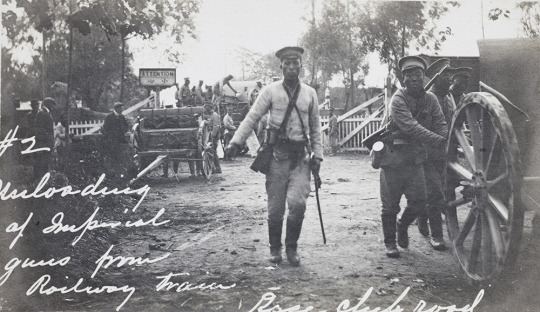
Scenes from the Battle of Yangxia, during the assault on Hankow, October 26, 1911, as Qing loyalist troops launch an attack on the beleaguered revolutionaries.
1) Soldiers at railway crossing on Race Course Road, Hankow. University of Bristol - Historical Photographs of China, Stanely Wyatt-Smith collection, reference number WS01-080.
2) Unloading of Qing army guns from a train at the railway crossing on Race Course Road, Hankou. On reverse: G.[.].Strutt. / 2/1/12. University of Bristol - Historical Photographs of China, Charles Wheeler collection, reference number: Wr-s073.
#hankow#汉口#xinhai revolution#辛亥革命#qing china#artillery bombardment#artillerymen#heavy artillery#qing empire#anti-qing politics#end of the qing#chinese revolution#beiyang army#北洋军#阳夏之战#wuchang#chinese history#black and white photography#war photography
1 note
·
View note

